Tom Morello: "This is missionary work. I’m on a zealot’s mission out there"
We visit the past, present and future with one of the greatest riff writers and guitar innovators of his generation
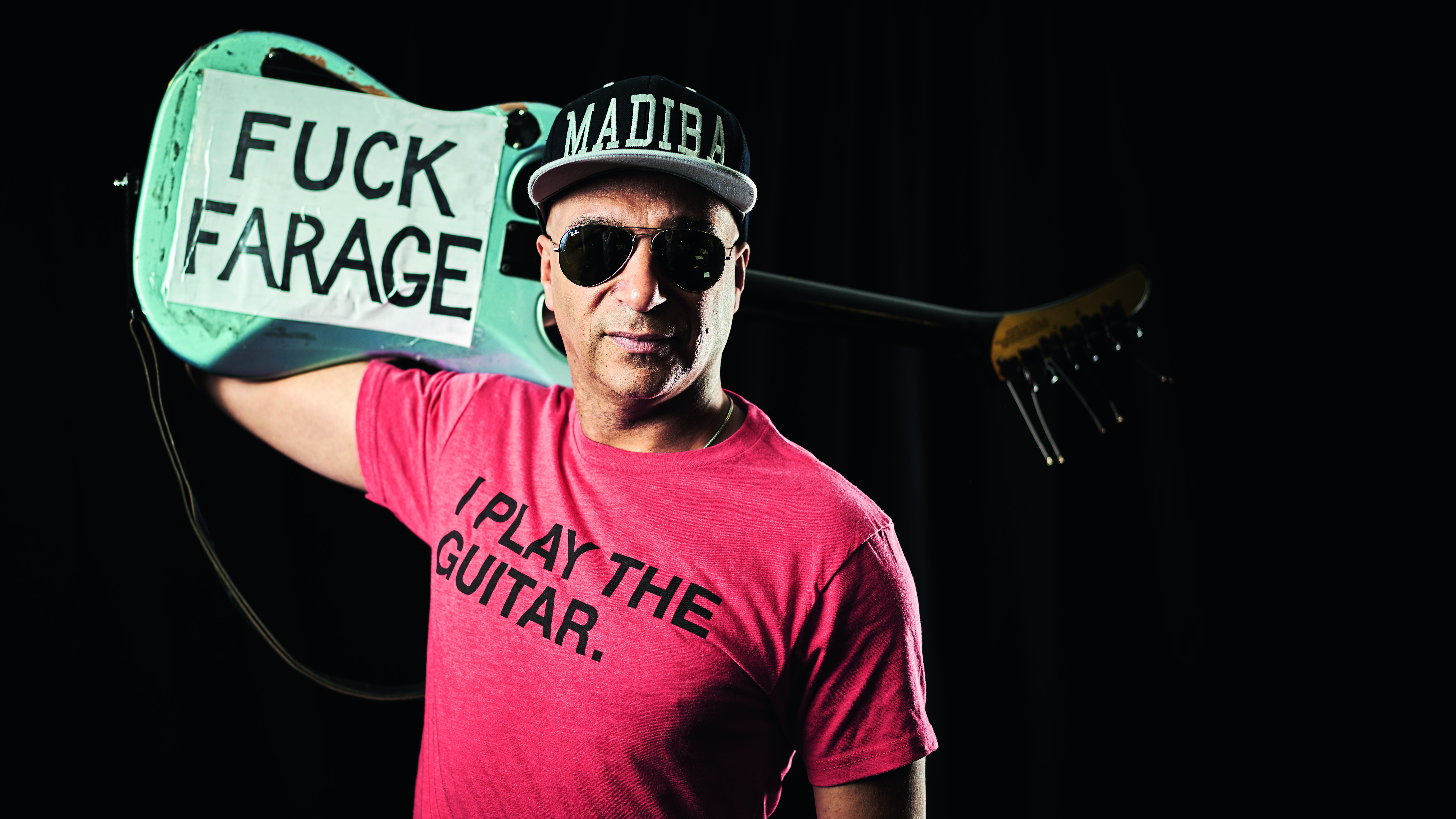
Want all the hottest music and gear news, reviews, deals, features and more, direct to your inbox? Sign up here.
You are now subscribed
Your newsletter sign-up was successful
When we meet Tom Morello he's sat on a leather sofa in the green room backstage at Bristol's Ashton Gate Stadium with a setlist on the table in front of him.
He's supporting Muse here tonight and as we shake hands our eyes dart across the room and fix on two familiar sights. We're guitar lovers so can't suppress a smile when we spot Arm The Homeless and the Sendero Luminoso Tele, the two instruments that have played an integral part in Morello's greatest music since the early 90s.
But the man who has stood as a member of Rage Against The Machine, Audioslave, Street Sweeper Social Club, Prophets Of Rage and even the E Street Band over the years is now touring under his own name for the first time. And while his solo outings as The Nightwatchman saw him strumming his trusty Ibanez 'Whatever It Takes' Galvador nylon-string, playing folk songs, this is very different.
"The challenge with this tour is I've made a collaborative record with 20 artists and none of them are on tour," he says of taking this year's The Atlas Underground album on the road.
I didn't have an expensive guitar, I didn't have a castle on a Scottish loch.
"So how do you curate an event that's going to be impactful? And you can see for yourself at the show that I've worked hard to create an event that is both very much looking towards the future but also respectful of my past with Rage Against The Machine and Audioslave.
"Sean Evans, who was the artistic director for Roger Waters' last two tours, he and I put the show together. The idea was, what is a punk rock show in 2019? It's not four dudes in leather jackets spitting on one another. It's something that is both musically and politically very challenging to the audience."
He's not wrong. What we see that evening is Morello in his element, the guitar still a thrilling sound in his hands, backed by drummer Eric Gardner and bassist/keyboardist/Musical MD Carl Restivo, while provocative political imagery flashes on the giant video screen behind.
Want all the hottest music and gear news, reviews, deals, features and more, direct to your inbox? Sign up here.
He starts the show playing amongst the crowd at Bristol's Ashton Gate stadium and from then on it's a sonic and visual tour of Morello's politics (including that Farage sticker) and back catalogue that takes in the new album, Rage classics, a moving tribute to Audioslave bandmate Chris Cornell, and Lennon and Springsteen covers. So it seems apt that we're going to be doing the guitar interview version of that with him right now…
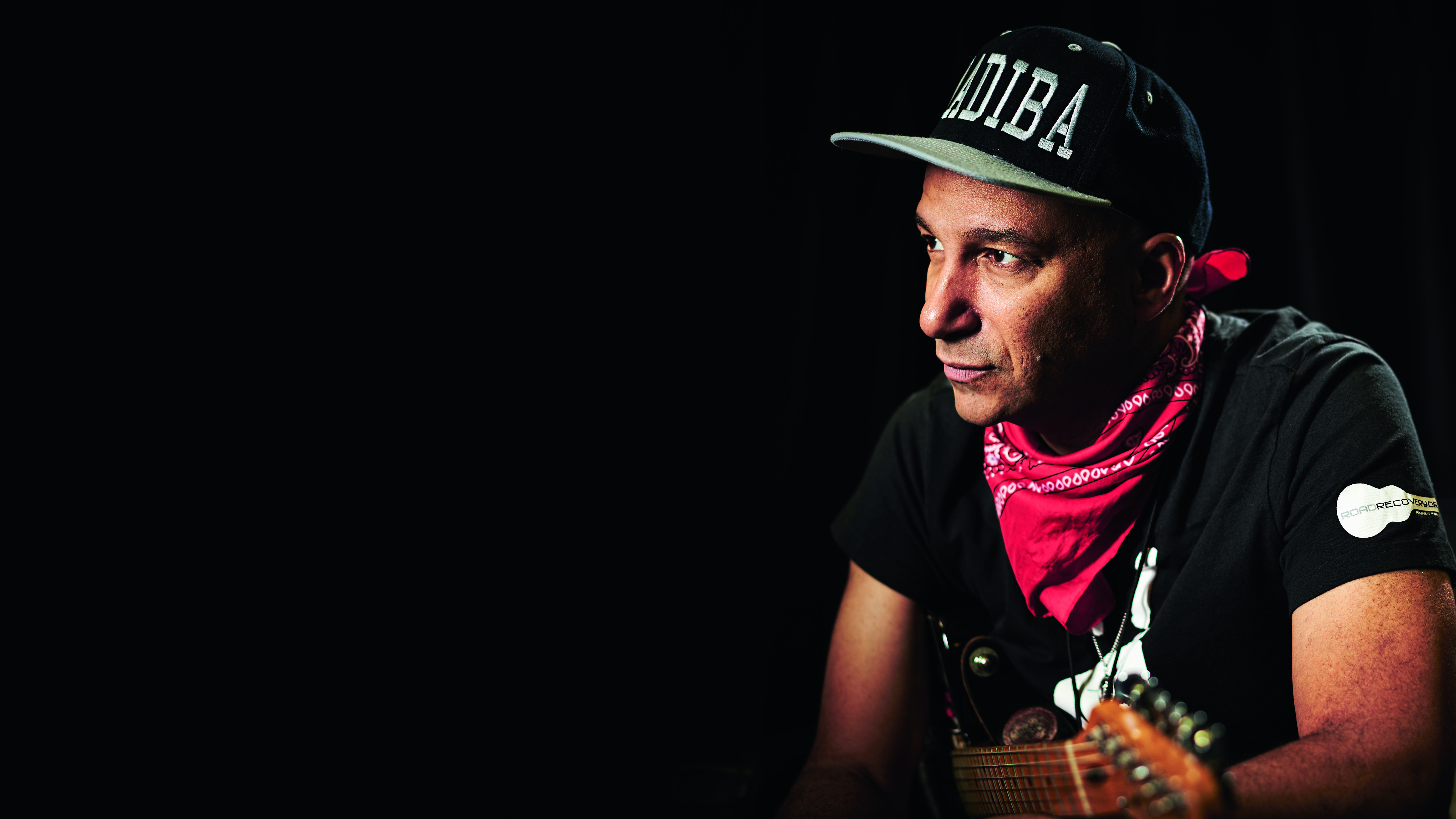
10,000 hours
Let's start at the beginning of your journey as a guitarist; you started playing at 17. That's relatively late compared to many musicians.
"I've never heard of anyone who made a record who started that late with one exception; that was Robert Johnson, who started at 18 but he had to sell his soul to the devil to do it. So I was just hoping, putting in my 10,000 hours of practice!"
Who were your inspirations then?
"I was motivated to get a guitar because of hard rock and metal music but I began playing guitar within 24 hours of getting the Sex Pistols on cassette. The guitar music that I liked previously, and still like – the Led Zeppelins, the Pink Floyds and things like that – it was out of my league.
"I didn't have an expensive guitar, I didn't have a castle on a Scottish loch. I didn't have any of that – I had a damp basement in Illinois and hearing the Sex Pistols and The Clash, it sounded like it was made in dank basements wherever they were but it was as powerful as anything I'd ever heard and I thought I'll sign up for some of that."
You put a lot of practice time in during those early years, but was there a turning point where you began to pursue this individual road that you went down as a player that's made you so unique?
"When I began playing I was very punk-rock inspired and didn't want to learn anything from anybody and just wrote three-chord songs. And then my obsessive compulsive disorder took over and I began practising four, six, eight hours a day 365 days a year while pursuing a political science major at an Ivy League university.
"It's not a recipe for a strong social life but even through that, when I was amassing a certain amount of technique, I was becoming an accomplished musician but I wasn't becoming an artist. And I think those are separate things.
"It was at the beginning of Rage Against The Machine where I self-identified as the DJ in the band that I really began to find my own voice on the instrument, not trying to play like Eddie Van Halen, or Steve Jones or whoever. And once I started experimenting in that DJ, turntable scratch and emulating animal sounds and helicopter sounds, that lane was completely open and I began to find my own voice."
And Rage had no commercial aspirations when they started?
"No, I had already been in a band prior to Rage called Lock Up that had great commercial aspirations. We were signed to a label and we were dropped. My career was done as far as I was concerned at 27 years old, I'd had my grab at the brass ring and I had failed to grasp it. So I made a solemn vow to myself that if I'm not going to be successful I might as well play music that I just love. And that's when we formed Rage Against The Machine."
Rage Against...
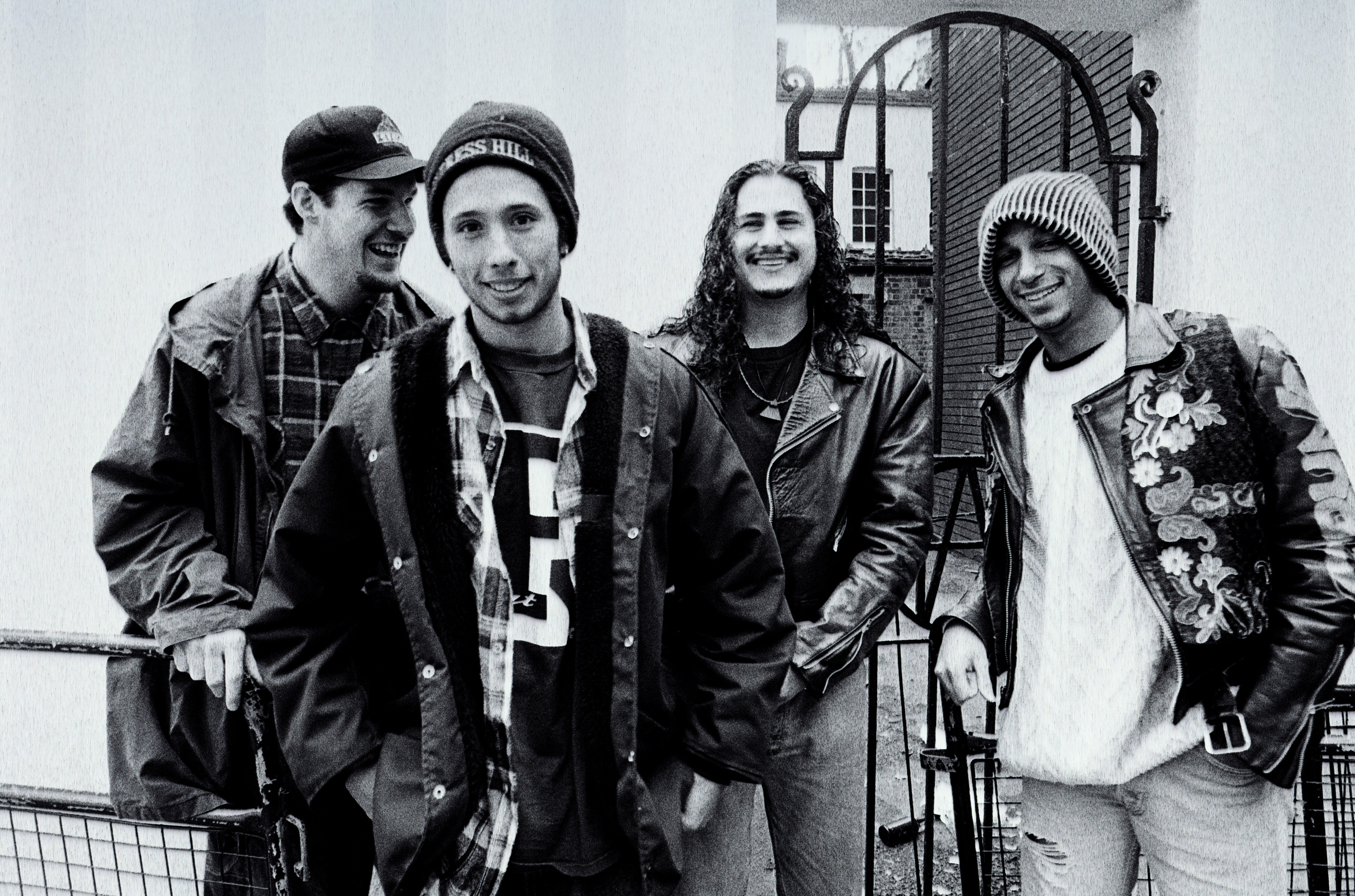
How important was Brad Wilk's drumming in shaping the riffs you had then that would fuel that first Rage album?
"All four members were key but there's just a way he and I play together. I remember, we couldn't afford to rent a studio so we would rent the space in front of someone's heavy metal drum kit in their rehearsal studio. So there would be like this big Iron Maiden drum kit in the background and me and Brad with our rinky dink setup. But we were playing Know Your Enemy, Township Rebellion and Freedom, and it sounded… the way that he plays a little behind the beat, I play a little ahead of the beat and we locked in for the very first time.
"I always thought he was an incredible drummer, to this day. I didn't imagine in those little rehearsals we would one day be rocking those and headlining festivals but that's how it turned out."
Has the way you write riffs changed since then?
"That's a good question. I often write on an acoustic guitar, the guitar I've always had in the house was originally because you couldn't be blasting a Marshall stack with the neighbouring apartments.
"I'm used to being comfortable and just waiting for inspiration to strike. I pick it up to practise scales or strum a Bob Dylan song and the next thing you know there will be this super-heavy field-bouncing riff and it's, 'Quick! Record that one,' and then move on."
Single-coils and neck pick-ups
In the late 80s and early 90s there were a lot of rock players using humbuckers, but you went towards single-coils. Was Jimmy Page with his Tele on the first Zeppelin album an influence on that?
"Jimmy Page would be the archetype of that but with my riff writing, there was a lot of Deep Purple in it too and those riffs are heavy, those riffs are funky and there's a lot of single-coil. And the combination of my single-coil riff playing and Timmy's [Commerford] massive [bass], he really does sound like three or four Black Sabbaths playing at the same time. He really fills up the low, the deeper low and all the mid and then with the springiness of my riffs, it was just a matter of chemistry."
You often use the neck pickup too – a lot of players might be surprised how many of those classic riffs are played on that.
"All those riffs, and the two guitars are in the room here – [Arm The Homeless] is for all the ones in E and [the Tele] is for all the ones in drop D. There's 10 radio Rage Against The Machine and Audioslave songs recorded on this [Tele], playing on the neck pickup.
"Whether you're a journalist, a photographer or build the stages for today's show, history is in your hands. Just don't wait around for some band to save the day."
"This is a standard stock Telecaster. To me it always sounded right to my ears and sometimes I think the heaviness of the riff hasn't got anything to do with the amount of distortion on the guitar. There are plenty of bands and albums that are distorted out the ass and I just feel [they're] not moving at all in a way that is compelling."
A lot of players constantly search for new gear as a creative solution. But you seemed to reach a point early on where you said, 'I'm going to work with what I have'…
"I gave up! [laughs]. It was a matter of giving up. I too was one of the typical guitar players; I wanted to sound like some kind of combination of Randy Rhoads and Steve Vai and Tony Iommi. And it just didn't. And so one day, I had my amp and [Arm The Homeless], fiddled around with it for a few hours and got it to somewhere where I decided that's just what it's going to be.
"I marked the amp and it's the same amp head onstage that was in that room 30 years ago [a Marshall JCM 800 2205 50W] from that session and I said, 'This is going to be my tone and I'm never going to think about it again. I'm just going to create with this tone.' It was liberating. I've never had to shop for gear or chase some tone. This is my tone, now what songs are going to come from that?"
Audioslave
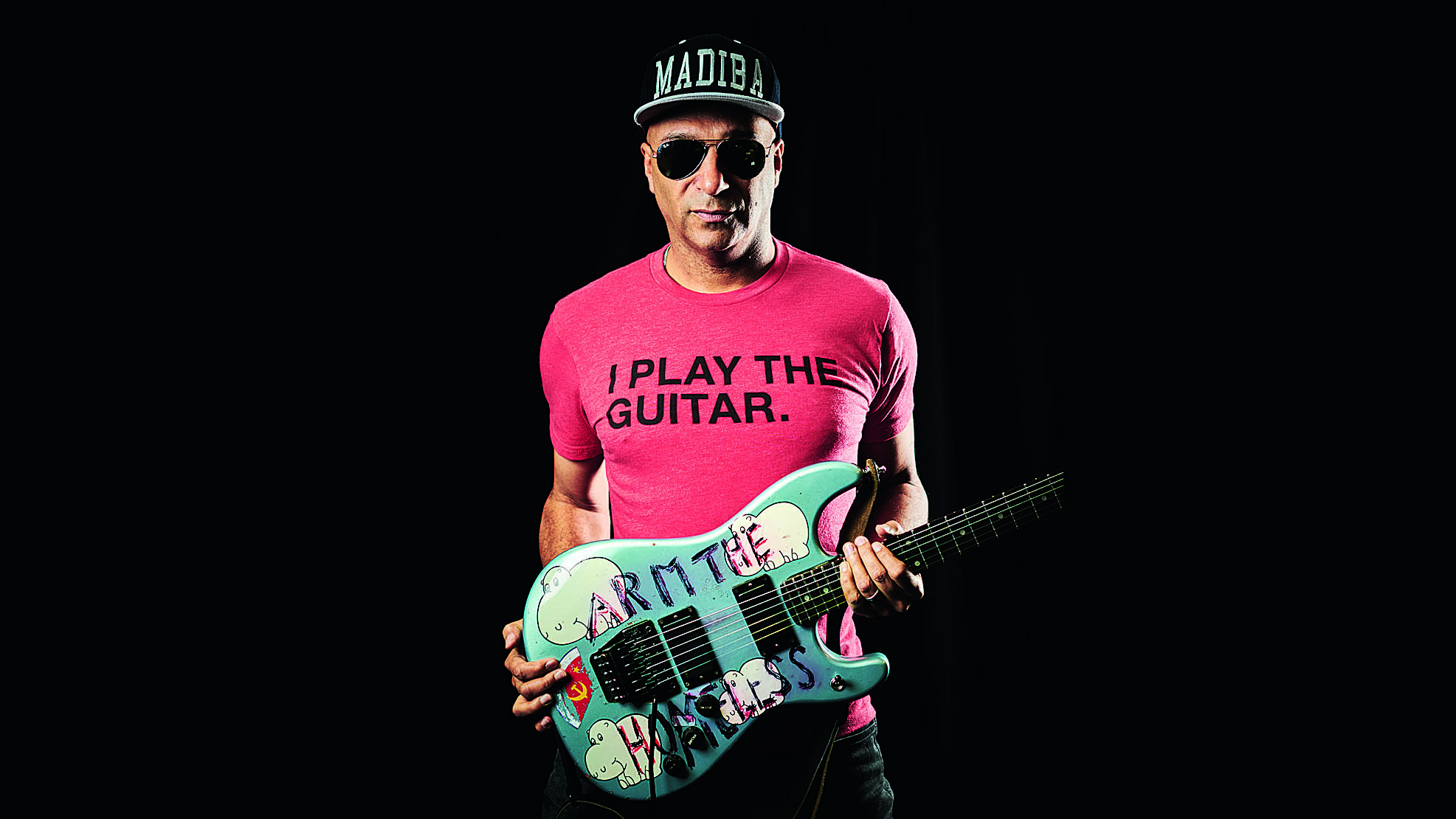
When you, Timmy and Brad formed Audioslave with Chris Cornell, all four members had achieved success by that point but what was that first experience like in a room as a new band?
"We had two sessions, we jammed once and then we got together for two days in a row to write songs. I think we wrote Light My Way, a couple of songs that appeared on the first record. While Chris Cornell was a friend and a bandmate, I never stopped being a fan of his. He has one of the most incredible voices in the history of music. Just being in a room with him… and the thing that was perhaps the most amazing was not just his singing voice, and this is underappreciated; it's his ability to create great melody out of the ether.
"In almost like a Beatles way but more in a hard rock genre. You could throw a three-chord progression or a really tricky off-time metal riff and he would create beauty on top of it. I remember talking to Rick Rubin about it and he said, 'You don't understand. That guy's really special.' Because we'd never played with a melodic vocalist before; Zack [de la Rocha, RATM] is a tremendous vocalist but his strengths lie in other areas.
"And so the first singer we played with was Chris Cornell. We said, 'These songs sound pretty great,' and Rick's like, 'You have no idea, it's so hard to make a great song'. And we said, 'No it's not, we made one up on Wednesday and another one on Thursday!'."
There were certain songs like Light My Way that sounded like you might expect from that collaboration, but the likes of Like A Stone and Getaway Car drew out different things from you. Were those other sides always there in your playing?
"Those things were always there and in my 10,000 hours of practice there's a wealth from renaissance music to fusion and Chris really sort of unlocked that musical Pandora's box to allow us to go in any sort of direction we wanted."
Was there a specific point or experience that made you want to write and perform your own songs as The Nightwatchman?
"Yes, it was around the formation of Audioslave and there was this little [group] of songwriter friends and we'd go to open mic nights around Los Angeles. I'd been a big fan of Dylan and Springsteen's acoustic works and had dug back to Woodie Guthrie and Phil Ochs. I just thought, well I've got some things to say too and it really unlocked an entire wing of artistic expression for me and I fell head over heels in love with that.
"Also it was a great lesson in taking control of your life. Because when you're in a band it's a four or five-way marriage and any decisions in the bands I've been in have been democracies. We've all got to agree in order to move forward and that's hard sometimes. And with this I had a lot of political stuff I want to do and I have an acoustic guitar and I don't need to have a band meeting, I just go and do it.
"So it freed me up in my Audioslave world to be a better bandmate because in that world we'll all figure it out and it happens when it happens, but in this I'm going to have a purity of vision and be able to do whatever I want. So that's my recommendation to all guitar players out there; you have to learn to sing your own song in order to have that kind of freedom of movement and expression."
What was that like as a musician moving from writing music for other vocalists to writing songs for your own voice?
"It was exciting and challenging. I would be on tour with Audioslave and on nights off I would go to open mic nights. We'd be playing an arena in Cleveland and on a night off in Cincinnati I'd go to some local bar, sign up with everybody under the name The Nightwatchman, wait to play my three songs, nervously trying to remember the lyrics; but I was as committed to those performances as anything I ever did at Reading festival.
"I really felt like I was doing what I was supposed to be doing. Today's show, this is missionary work. I'm on a zealot's mission out there. Joy is part of that mission but it's also a little bit of the carrot and a little bit of the stick." [laughs]
It's interesting that you weren't just focused on one project then because that's the case now with the solo work as well as your recording and shows with Prophets Of Rage…
"I'm jealously possessive of having some area of my creativity that is solely under my control. It's very, very important to have that outlet, but then be able to have the great fortune to have the chemistry of playing with B-Real, Chuck D and DJ Lord, Timmy and Brad. There's nothing like that feeling."
You're a huge Springsteen fan. When you toured with the E Street Band did you gain a different understanding of him as a musician?
"Yes, the thing that was not surprising with him and has been evident at every step of his career is his commitment to absolute excellence in every area. He goes out there every show, every night… this is going to be the greatest Bruce Springsteen show tonight.
"In the front row I'd see the same people on four different continents. They're so excited to see Bruce Springsteen that they'll fly around the world. But you know what? He's even more excited to be there than you are. It's great to stand next to him because I've got that in me too so it's great to feel a harmonious thing.
"It's also challenging himself, his band and his audience. On the last US tour that I played with him, we played 34 shows and 182 different songs. I mean that's nuts. The level of how present you have to be and at any moment to play any song by any artist. That's what the gig is. It's crazy."
So he brought things out of you that you never expected?
"Yeah because I never had that bar band experience when you know every [jukebox hit]. I don't know Brown-Eyed Girl; I don't know that song but I have to play it in a Melbourne stadium. Do you know how much time I have to play it? '1,2,3,4'. That's how much time I have to learn it. What key is that song in?!"
Atlas Underground
You're bringing the guitar to new ears on The Atlas Underground…
"My thinking about this record is that it would be a Trojan horse, a way for me to inflict my guitar vision on a new generation, by unapologetically and authentically playing Marshall stack riff rock, crazy guitar solos like I do, but combining it with bass drops and younger artists like Portugal. The Man to K.Flay, and more established artists like Marcus Mumford and Gary Clark Jr, to make a record that was very much a solo record in its vision but a collaborative record track by track."
It wasn't musicians writing in a room together during the collabs. How did that affect your creative dynamic?
"It was intentional. This is my 19th studio record and 18 of them have been made with four guys in a room, more or less. I really wanted to make a record where I was going to challenge myself. And when I started writing songs for this record they were tending towards patterns I had done in the past. I wanted to make a record that was outside of that.
"So I thought, What happens when I call up Knife Party and send them 10 riff ideas and say, 'You do what you do but replace the synthesisers with my Marshall stack' – what are we going to get? Battle Sirens the first song on the record… Bassnectar and I, we toiled trying to figure out what is going to be the right groove and it turned out just to be [plays riff to Rabbit's Revenge] which turned out to be a little warm up riff that I had that he turned into this huge track that Big Boi and Killer Mike couldn't wait to get on.
"Each song had its own journey in that way and that was part of the fun of making the record."
You've never pandered, and always seem to play music that's true to you and not worried about…
"The commercial or political ramifications! [laughs]"
Are you seeing many young musicians out there channeling their anger and frustration in the political climate we're in?
"That never goes away. Those musicians may not be at the top of the charts but in a multiplicity of genres, from punk to hip-hop and rock 'n' roll, there's always bands that do have something to say.
"Yes that's encouraging but that's less important than people, no matter what their vocation is, standing up for a more decent or humane planet. Not waiting around for some rock band to do it.
"Whether you're a journalist, a photographer or build the stages for today's show, history is in your hands. Just don't wait around for some band to save the day."
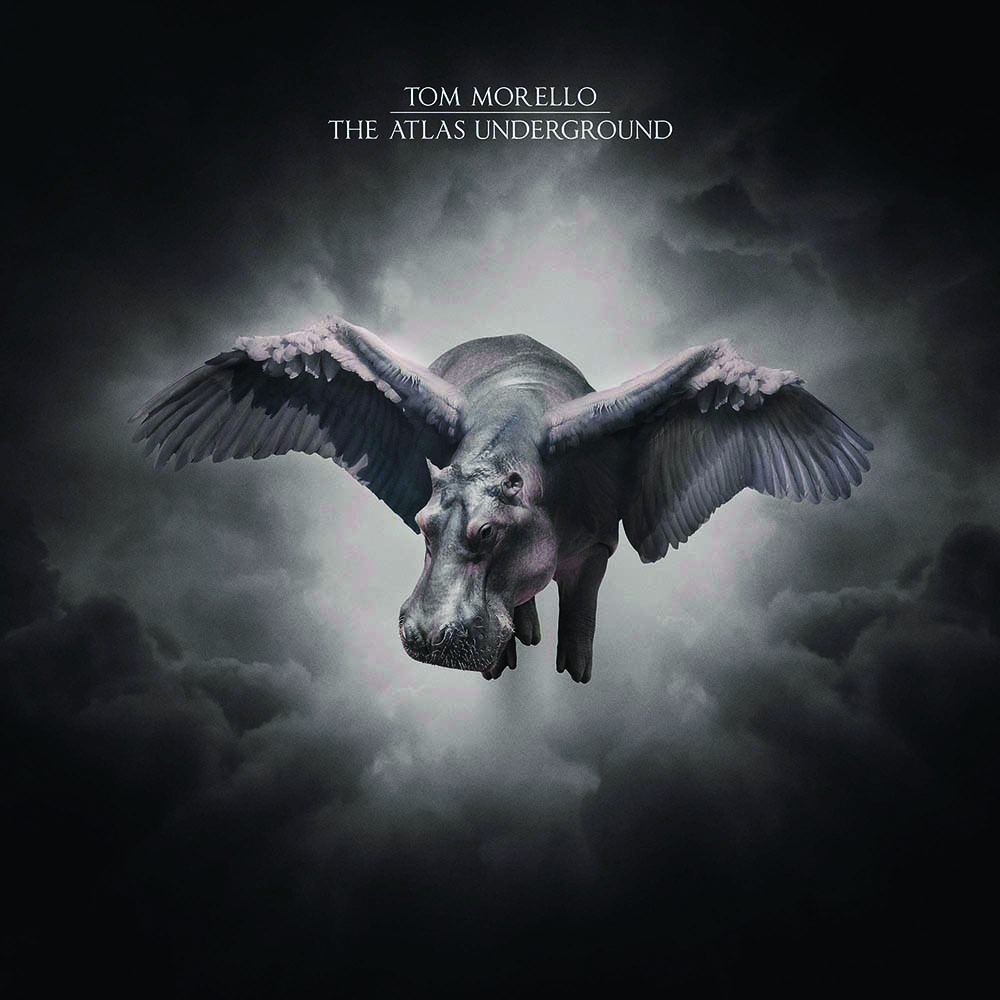
The Atlas Underground is out now. Tom Morello is currently working on a follow-up collaboration album. Prophet's Of Rage's latest single Made With Hate is out now

Rob is the Reviews Editor for GuitarWorld.com and MusicRadar guitars, so spends most of his waking hours (and beyond) thinking about and trying the latest gear while making sure our reviews team is giving you thorough and honest tests of it. He's worked for guitar mags and sites as a writer and editor for nearly 20 years but still winces at the thought of restringing anything with a Floyd Rose.

